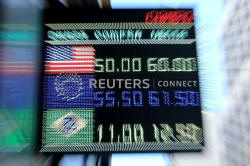Shares shunted after Argentina crash, safe-havens shine
 Send a link to a friend
Send a link to a friend
 [August 13, 2019] By
Marc Jones [August 13, 2019] By
Marc Jones
LONDON (Reuters) - Share markets fell for a
third straight day on Tuesday as fears about a drawn out global trade
war, protests in Hong Kong and a crash in Argentina's peso currency kept
investors huddled in bonds, gold, and the Japanese yen for safety.
Early 0.3%-0.6% drops from Europe's main indexes after some heavy falls
in China, Hong Kong, Japan and other parts of Asia left MSCI's main
47-country world index down nearly 4% for August so far.
Hong Kong's airport, the world's busiest cargo hub, had reopened after
protests closed it the previous day, but the mood remained febrile after
weeks of increasingly violent demonstrations in the Chinese-ruled
territory.
Investors were also still assessing the wider damage caused by Monday's
crash in Argentina after its President Mauricio Macri became the latest
pro-free market, pro-reform leader to be given a beating at the polls by
a populist rival.

The response was brutal. The peso collapsed 15%, equities crumbled 48%
in dollar terms --the second biggest one-day slump anywhere since 1950--
and the bond market crashed, with a 100-year bond that investors had
recently gobbled up tumbling 20% as fears of yet another government
default spiked.
"Yes, Argentina is a small economy. However, the last thing global
markets want to see is another market-friendly government fall to
populism and/or geopolitics," said Rabobank strategist Michael Every.
He added the "wall of worry" also now includes: the trade war, Brexit,
China, Hong Kong, Iran, Italy, Kashmir, North Korea, South China Sea,
Turkey, and Venezuela. "Did I miss anything with tired eyes?"
With so much uncertainty around, Europe's traditional safety play, the
10-year German government bond, saw yields hit a new record low.
Equivalent U.S. Treasury yields were straining for their lowest in
almost three years, gold was pinned close to six-year highs and the yen
was within a whisker of a seven-month peak versus the dollar.
ING analysts said the yen was benefiting "from the best of both worlds",
pointing to general risk aversion and a rush to price in more interest
rate cuts by the Federal Reserve. They think the yen, at 105.32 in
Europe, will rally to 102 or 103 per dollar later this year.

[to top of second column] |

An electronic board shows currency exchange rates in Buenos Aires'
financial district, Argentina August 12, 2019. REUTERS/Luisa
Gonzalez

There was also the danger that moves could be amplified as many traders and
investors are off for European and U.S. summer holidays. Yet, there was no
shortage of gloomy news for investors looking to catch their breath from several
months of market ructions.
PANIC AND CHAOS
The weeks-long protests in Hong Kong began in opposition to a bill allowing
extraditions to mainland China but have quickly morphed into the biggest
challenge to China's authority over the city since it took Hong Kong back from
Britain in 1997.
A state of "panic and chaos" now exists, the city's embattled leader Carrie Lam
said on Tuesday, defying fresh calls to quit.
As she spoke, the benchmark Hang Seng index hit a seven-month low. By the close,
it had dropped 2.1%, dragging down markets across Asia and taking its losses
past 6% since the protests began in June.
MSCI's broadest index of Asia-Pacific shares skidded 1.2% as Chinese stocks and
the Nikkei in Tokyo both fell around 1% too.
The dive for safety pushed gold up another 0.5% to $1.523 per ounce and its
latest six-year high.
Oil prices meanwhile held their ground as expectations that major producers will
continue to reduce supplies balanced out worries about sluggish economic growth.

Brent crude inched up to $58.74 while U.S. West Texas Intermediate futures were
flat at $54.81 a barrel.
It comes too with Saudi Arabia repushing plans to float its national oil company
Saudi Aramco in what could be the world's largest initial public offering (IPO).
"With Saudi Aramco reportedly eyeing an IPO once again, there is some support to
the idea that Saudi Arabia has a heightened interest in strong crude prices and
will cut its own output accordingly," Vienna-based consultancy JBC Energy said.
(Reporting by Marc Jones; Editing by Kirsten Donovan)
[© 2019 Thomson Reuters. All rights
reserved.] Copyright 2019 Reuters. All rights reserved. This material may not be published,
broadcast, rewritten or redistributed.
Thompson Reuters is solely responsible for this content. |